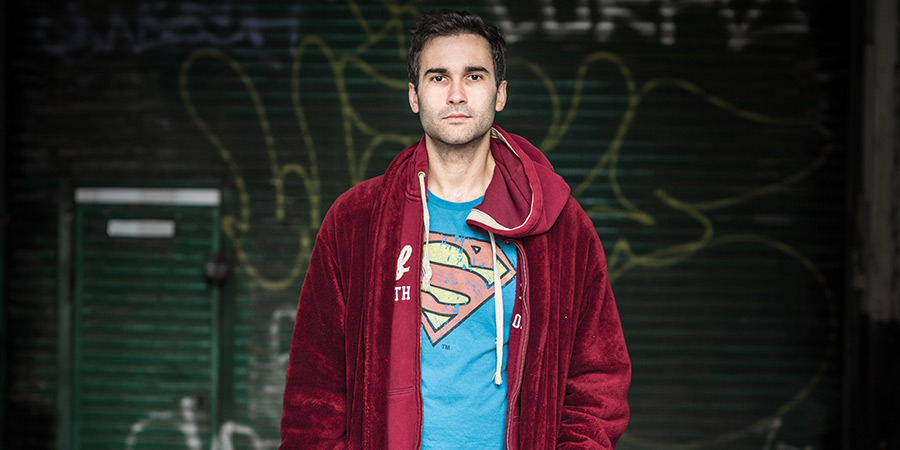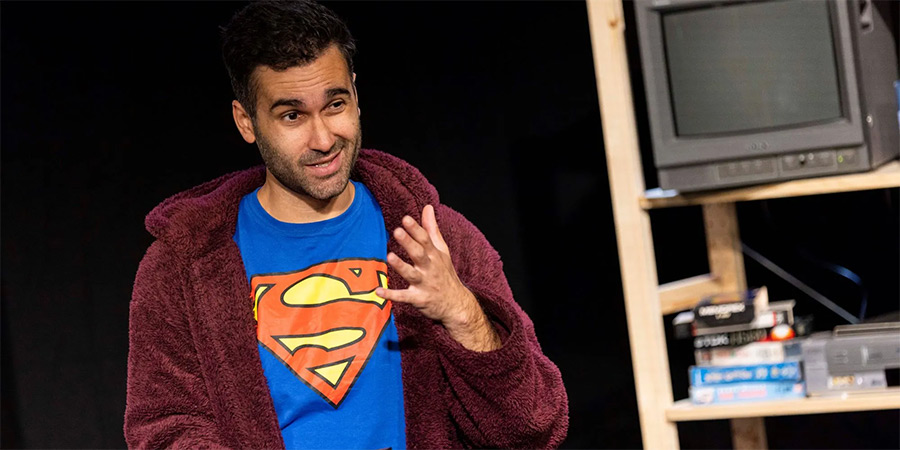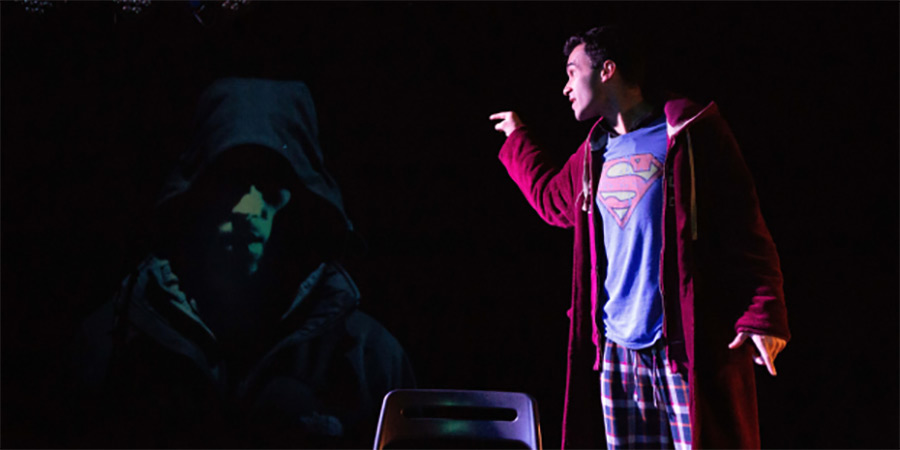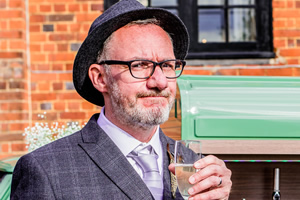
Fanboy lands in London to probe the enduring needs of nerds

Anyone who's ever innocently stumbled into an online debate about a big pop culture franchise - Star Wars or Justice League or Doctor Who or whatever video game sequel arrives this Christmas - will know that those threads can get weirdly hostile about what should be, on the face of it, fun.
And it's invariably adults doing the arguing; which is weird, when you think about all the important stuff people probably should be agitating about instead. Still, at least one positive has come out of all this once-niche noise.
The award-winning writer/performer Joe Sellman-Leava is particularly interested in why we cling so tightly to our joysticks and lightsabres, and has developed a suitably tech-clever play, with some savvy colleagues, to explore it. He's the George Lucas of small-stage nerdgasms.
Fanboy was a big hit at this year's Edinburgh Fringe and after a hyper-speed regional tour it's now docking for a week at London's Soho Theatre. But will he do a sequel? And a prequel? And a spin-off...? Let's find out.
How would you pitch Fanboy, Joe, to those of us who are usually more geeky about comedy stuff?
Fanboy is a funny, heartfelt deep dive into the joys and perils of being a nerd. It's about being obsessed by Star Wars, Donkey Kong Country and The Muppet Christmas Carol. It's a mix of jokes, storytelling, impressions (to recreate favourite moments from these things) and some inventive video design to conjure up both the past and the future. It's a show that will make you think, but also a fun night out!
Where did the idea come from? Was there a particular moment that sparked it?
It was back in 2019, and I was thinking about all the nerdy things I love - video games, Star Wars, superheroes - and how, at times, I've been completely obsessed with them. A version of the title and the poster image sort of floated around my brain, and I started jotting things down. I wanted to make something really funny and joyful to watch, that would appeal to people who love the same things I do.
But I was also thinking about how it felt to love these things during a time when nostalgia was a huge force in our entertainment - remakes, reboots, prequels, sequels, etc - and our politics ("Make America Great Again" and "Take Back Control" both conjure up imagined versions of the past), as well as in a time of deep division and upheaval.
Big news and big fantasy stuff do seem to cause similar aggro - it's an interesting subject.
I like to make shows centred around things that mean a lot to me, because it offers immediate ways to make the performance joyful, and to connect with an audience. I also love using these things as framing devices, through which to examine something deeper.
So the first big question that sparked the show was: "what it is about the world, right now, that makes me want to endlessly re-read, re-play and re-watch my favourite games, films and books from my youth?"
What were your particular fandoms as a kid, and how did those relationships evolve over the years?
Nintendo was a big one, and probably my earliest fandom - Mario, Donkey Kong, Zelda, Metroid. Then Pokémon - completely obsessed! Then Warhammmer. So much Warhammer... Space Marines, Tyranids, Lizardmen. I'd spend hours painting them, planning army lists, and battling friends.
My absolute favourite Games Workshop game was Blood Bowl - essentially orcs, goblins and elves playing American football! Lord of the Rings was another huge one. I devoured the books, watched the films endlessly, read loads of the wider stories of Middle Earth.
Oh and, of course, I collected, painted and played Games Workshop's Lord of the Rings Strategy Battle Game (aka Lord of the Rings Warhammer!).

Crikey. Did you have non-fantasy passions too?
A slightly more niche fandom was birdwatching - I was a member of the Young Ornithologists Club (the, ahem, youth wing of the Royal Society for the Protection of Birds!). And I can't remember a time when I wasn't watching David Attenborough shows.
These great loves ebbed and flowed over the years. As they evolved, I saw the huge role they were playing in many of the key relationships in my life. They were, and still are, a huge part of some of my deepest friendships. They're how I stay connected with my family. And they've often been a crucial part of romantic partnerships.
When I started writing the show, I realised how much of my love for each fandom was tied up with the love I have for the people I share them with. To this end, Fanboy presents a (partly fictionalised) story about three significant relationships - a wise mentor, a best friend, and a great love - each of them cemented around the midnight launches of three different Star Wars films.
The show sounds quite technically inventive - was it a logistical challenge to put together?
Haha - yes, it gave me nightmares at times, as my technical knowledge is fairly limited. But it was something I was always really excited about and, luckily, Yaz Al-Shaater and Dylan Howells - who respectively directed and designed the show - are both technical wizards.
I think, together, we've found a cool narrative device in the technology. I don't want to say too much, as I hate spoilers, but it's in how we present the past and the future on stage. It's the most technically ambitious piece I've made, which allows it to begin as a pared-back solo show then, as the story unfolds, grow into something more epic.
Why do you think such seemingly fun things (Star Wars, Marvel, Doctor Who etc) cause such aggro, among their fans?
I think if something we love starts to change, some people might feel like it's under threat. Many feel a sense of belonging in our chosen fandoms, but for some it's more than that. It's about ownership: "you don't like this as much as me!" or "I liked this before you did!" or "you don't understand it - you're not a real fan" etc.
This may seem childish, but as we've seen in the backlash to some of the recent expansions in the Star Wars, Marvel and Lord of the Rings franchises, they can be incredibly toxic - fuelled by hate and prejudice, and cause real harm.
I wonder if part of the reason this seems particularly amplified in the fandoms I've mentioned is that there was a time that these things were less mainstream. Still huge in their field, but not as much in the collective consciousness as they are now.

It's true - now everyone has an opinion on, say, the new Marvel film, but they were still pretty niche a decade ago.
They were probably safe places for people who might have felt lonely, isolated, or were perhaps bullied as kids. And now that these things dominate the pop-cultural landscape, some people feel like it's not fully theirs anymore, and this comes out in unhealthy ways, including (ironically) bullying - especially online.
Don't get me wrong - I've found myself ranting about, say, a particular franchise entry that (to me) doesn't live up to its predecessors. There can be a certain kind of joy in unpacking why something doesn't work for you.
But when opinions become personal attacks, and criticism becomes bullying, that's unacceptable. There's no place for it. I really hope that as fanbases continue to broaden, things will become less toxic. Surely we want to share the things we love with more people - isn't that a good thing?! And, as you say, it's supposed to be fun!
How was the Edinburgh Fringe run - do you reckon the subject matter attracted people who wouldn't normally see theatre?
It was great to be there! We'd had to pause halfway through making it for the cancelled 2020 Fringe, so it was brilliant to finally finish making the show and start performing it.
I do think the subject matter helped reach new audiences - lots of people told me they'd come along because they love some of the things it references, or because of the title or the image.
We also got one of our favourite reviews for the show in Starburst magazine, which I think also helped find audiences who might not otherwise have come along. I'm always really excited about the different reasons people might be drawn to a show.
I think one of the best compliments you can get is when someone tells you it isn't normally their sort of thing, but they loved this because something about it meant a lot to them.
Do you have any further plans for Fanboy? Prequels, sequels, an expanded universe...?
Soho Theatre marks the end of this current tour but, all being well, it'll tour again in 2023. It hadn't occurred to me about prequels or an extended universe - maybe a graphic novel could work!
Thinking about it, I wonder what a prequel would look like... unnecessary CGI? Clunky dialogue? Or perhaps I'll wait 20 years and make a sequel, interacting with footage of myself from now!
Help us publish more great content by becoming a BCG Supporter. You'll be backing our mission to champion, celebrate and promote British comedy in all its forms: past, present and future.
We understand times are tough, but if you believe in the power of laughter we'd be honoured to have you join us. Advertising doesn't cover our costs, so every single donation matters and is put to good use. Thank you.
Love comedy? Find out more
